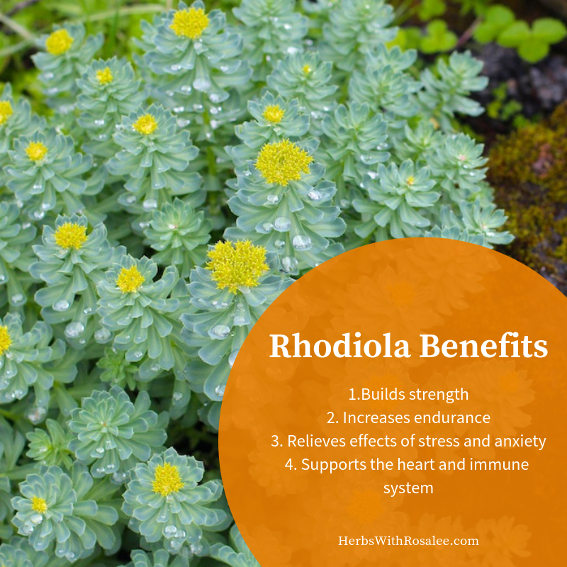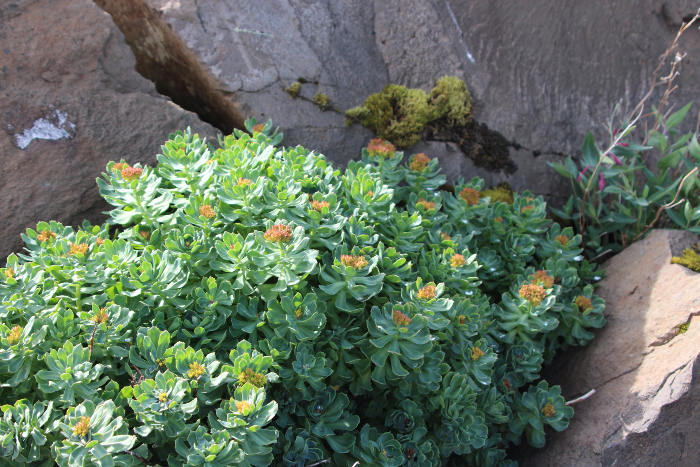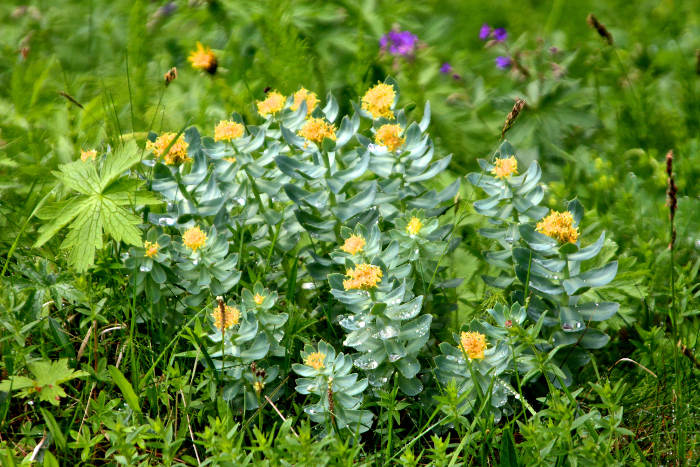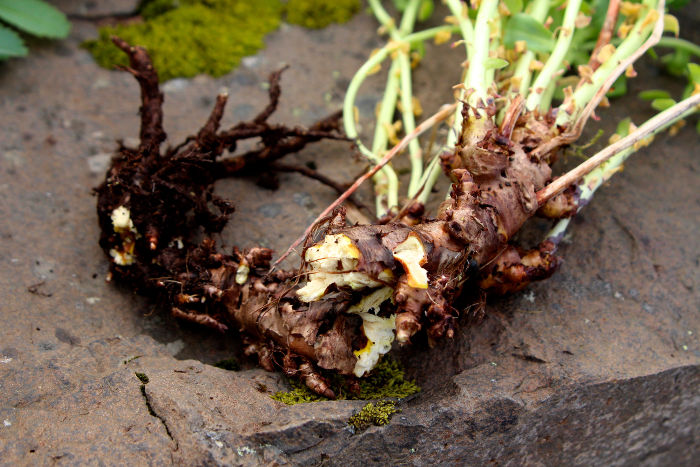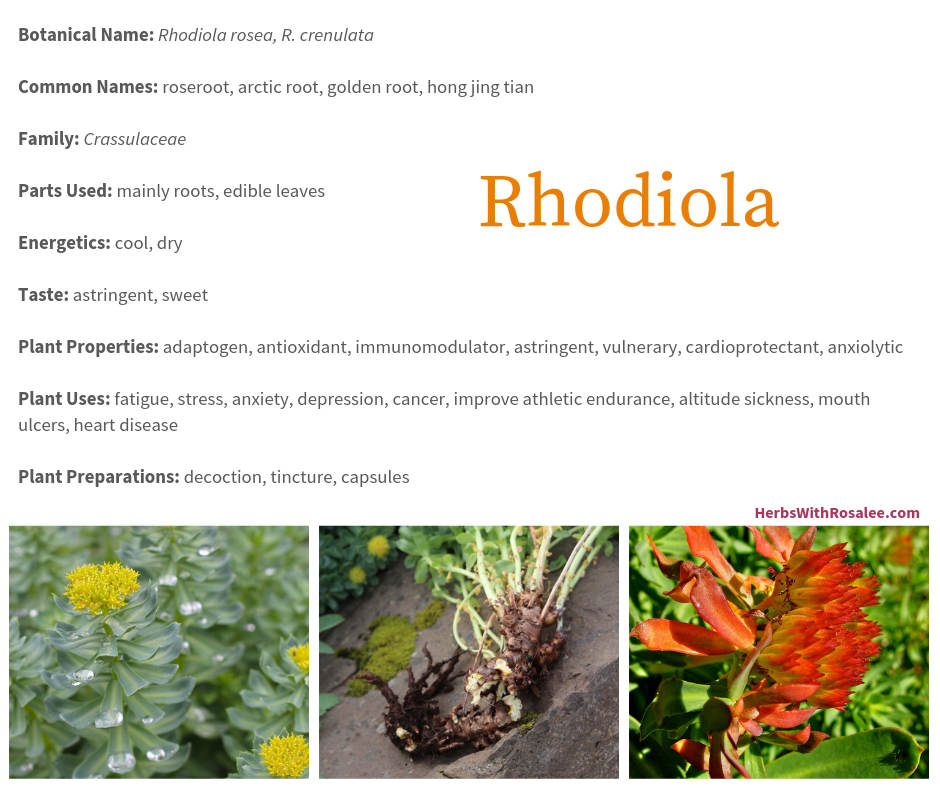Get weekly tips, recipes, and my Herbal Jumpstart e-course! Sign up for free today.

Rhodiola Rosea Benefits
Share this! |
|
Creeping out of rocky cliffs in the harshest of environments, Rhodiola displays strength, stamina, and perseverance in its very essence of being. With a long history of use in traditional medicine and hundreds of studies performed in Russia and Asia, Rhodiola has been slowly creeping into Western herbal medicine. Loved by many and questioned by some, Rhodiola may offer much needed help for many of today’s common health problems.
Rhodiola Rosea Benefits as an Adaptogen and for Athletic Endurance
Above all, Rhodiola is heralded as an adaptogen herb. Adaptogen herbs are building and nourishing herbs that offer broad-spectrum resilience, helping humans to adapt to stress and other nervous system challenges. Chinese emperors traditionally used Rhodiola in their quest for long life, while Siberians traditionally used it to prevent illness during the winter. Vikings relished the increased strength they got from Rhodiola.
In recent years, Rhodiola has been studied for its ability to increase the stamina and endurance of athletes. One small study found that a combination of Rhodiola root and Cordyceps fungus improved athletic endurance in men who were also undergoing high altitude training.1 Another small study showed that Rhodiola “may increase the adaptogen ability to physical exercise.”2 Other studies have shown little to no benefit for athletes.3 Larger well-designed trials are needed.
Rhodiola Rosea Benefits To Address Depression, Anxiety and Cognitive Health
Many herbalists use Rhodiola to support people with depression and anxiety. A common theme is to use Rhodiola for depression relating to seasonal changes. Icelandic herbalist Anna Rósa Róberstdóttir uses it for people who have “depression because of darkness.” Herbalist Beverly Gray reports, “It brings relief to people who live in extreme climates and are challenged by seasonal affective disorder (SAD).”4 David Winston, author along with Steven Maimes of Adaptogens: Herbs for Strength, Stamina, and Stress Relief, says, “I regularly use Rhodiola for people with deficient (asthenic) depression, altitude sickness (used with Cordyceps, reishi, and holy basil), and attention deficit hyperactivity disorder (ADHD), as well as to help people recover from head trauma injury.”5
Rhodiola Rosea for Depression
There have been many studies looking at Rhodiola in regards to depression, but there are a limited number of well-designed human clinical trials. In looking at a range of studies from cell cultures to humans, a review of Rhodiola in the treatment of depression by the American Botanical Council reports, “These studies have provided evidence that the antidepressant effect of Rhodiola may be associated with the following mechanisms: modulation of stress response mediators, modulation of the hypothalamic-pituitary-adrenal axis homeostasis, modulation of G-protein coupled receptor signaling pathways, and stimulation of expression and release of neuropeptide Y (NPY).”6 In other words, Rhodiola seems to improve many different facets of cognitive health.
“My college students can attest to its ability to improve focus, memory,
mental energy, and test scores while reducing exam stress, and
menopausal clients love it for relieving brain fog and stress-related
memory lapse.”
Maria Noel Groves, Body in Balance
In one study, researchers studied the difference in both efficacy and adverse effects between a standardized extract of Rhodiola,
sertraline (Zoloft), and placebo. The results showed that while the
Rhodiola standardized extract was slightly less effective for
depression, it also had fewer adverse side effects and was better
tolerated than the sertraline. The researchers concluded that “these
findings suggest that R. rosea, although less effective than sertraline,
may possess a more favorable risk-to-benefit ratio for individuals with
mild to moderate depression.”7
Rhodiola Rosea Benefits To Tighten and Tone Tissues
Lost in the bright headlines of Rhodiola’s amazing actions is a more nuanced view of its energetics: Rhodiola is a significantly astringent plant. You’ve experienced astringency if you have ever eaten an unripe banana or drunk strong black tea. This action helps to tighten and tone tissues and is helpful for reducing swelling, healing wounds, and generally addressing lax tissues. In keeping with this action, Rhodiola was historically used to heal wounds, address diarrhea, and stop bleeding.
Due to its high level of astringency, however, Rhodiola can be problematic for people who already have toned tissues and/or signs of dryness. In this case, constipation, dry sinuses, and headaches can be common adverse side effects. In some cases, people have reported feeling anxious or uncomfortably hyperfocused. As with any herb it’s a good idea to start with small doses to gauge your individual reaction to the herb.
Rhodiola Benefits To Protect the Heart and Lungs
In Traditional Chinese Medicine (TCM), Rhodiola is used to address a range of heart and lung issues. In TCM terms, Rhodiola moves Blood and boosts Spleen and Kidney Qi.
One in-vitro study showed that Rhodiola crenulata “protected endothelial cells from hyperglycemic insult and demonstrated its potential for use as a treatment for endothelial dysfunction in diabetes mellitus.”8 The endothelial cells that line the blood vessels are a target for prevention of atherosclerosis and cardiovascular disease in diabetics.
A randomized placebo-controlled double-blind clinical trial showed that R. crenulata had numerous benefits for people with chronic obstructive pulmonary disease (COPD), including protection against acute exacerbation of COPD and improved tidal breathing and ventilation efficiency.9
Rhodiola Benefits as Possible Uses in Cancer and Chemotherapy
Numerous in-vitro studies have shown Rhodiola, and extracts of Rhodiola, to be effective against various cancers, including colon cancer and breast cancer.10,11,12,13 More rigorous studies are needed to better understand how Rhodiola may help those with cancer.
One interesting study found that R. algida helped people undergoing chemotherapy to both reduce their oral ulcers (a common adverse effect of chemotherapy) and to more quickly recover their white blood cell count. The researchers concluded that “Rhodiola algida has the potential to be used concurrently with chemotherapy to alleviate the occurrence of oral ulcers.”14
Botanically Speaking
There are about 90 different species of Rhodiola, with about 20 of those having a history of medicinal use.15
Rhodiola thrives in rock outcroppings in northern and Arctic biomes, including boreal forests. It can be found in northern Canada and northern Europe and Asia, but also grows at higher altitudes in the Rocky Mountains and California’s Sierra Nevada in the United States.
Rhodiola is a perennial succulent with male and female flowers growing on separate plants (dioecious).
The small rounded or pointed leaves grow in a tight alternate pattern up the stem.
The flowers grow in a dense terminal cluster and range from yellow or pink to red and magenta. In some species, male flowers are yellow while female flowers are pink/red.
The roots (rhizomes) are scaly and grow horizontally. When crushed they can give off a slight “rose” scent, thus the common name “roseroot.”
Using Rhodiola
Unlike many other adaptogens, you can feel the results of Rhodiola fairly quickly after taking it (within days to a week).
Many herbalists prefer the fresh root tincture as this is said to have better results with fewer adverse effects.
The
roots can be made into a decoction or powdered and used in capsules.
There are many standardized extracts of Rhodiola available on the
market.
Keep in mind that this is a sensitive plant that is
becoming increasingly popular. Many products on the market have been
shown to be either of decreased potency or even adulterated with
unrelated plant material.
Rhodiola Rosea Dosage
Powder: 500mg+ per day.
Decoction: 3-6 grams per day.
Fresh Root Tincture: 1:2, 40% alcohol, 2-4 mL, three times a day.
Herbalist
Robert Dale Rogers says, “I find the fresh root at 70% with 10%
vegetable glycerine at 1:3 is a great tincture that is much less
astringent, and keeps tannins from precipitating.”
Leslita
Williams adds, “Quality makes all the difference. My experience with
clients who used Rhodiola in commercial capsules, or tea or tinctures
made from bulk herb purchased from some of the better known "herb"
companies – got either no results or negative reactions. Then I got some
Rhodiola from a grower on a small farm in Canada and it was a totally
different plant – alive and very fragrant and not overly astringent.”
Rhodiola Safety
- Buy only cultivated Rhodiola to protect this sensitive slow-growing species in the wild.
- Take earlier in the day to avoid being stimulated in the evening/night.
- The most common adverse effect reported is headaches.
- Many Rhodiola products on the market are of substandard quality or adulterated.16
- David Winston recommends against using Rhodiola in people with bipolar, manic, or paranoid mental states.17
Citations for Rhodiola Rosea Benefits
Click to show/hide.

Rosalee is an herbalist and author of the bestselling book Alchemy of Herbs: Transform Everyday Ingredients Into Foods & Remedies That Healand co-author of the bestselling book Wild Remedies: How to Forage Healing Foods and Craft Your Own Herbal Medicine. She's a registered herbalist with the American Herbalist Guild and has taught thousands of students through her online courses. Read about how Rosalee went from having a terminal illness to being a bestselling author in her full story here.
